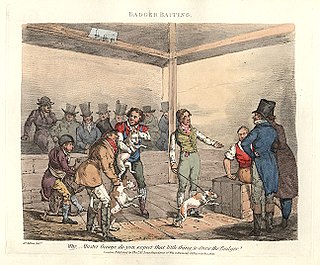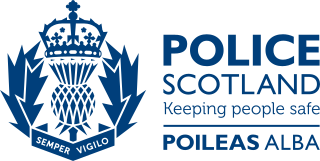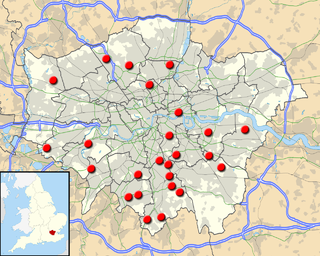Related Research Articles

Poaching has been defined as the illegal hunting or capturing of wild animals, usually associated with land use rights. Poaching was once performed by impoverished peasants for subsistence purposes and to supplement meager diets. It was set against the hunting privileges of nobility and territorial rulers.

The Wildlife and Countryside Act 1981 is an Act of Parliament in the United Kingdom implemented to comply with European Council Directive 79/409/EEC on the conservation of wild birds. In short, the act gives protection to native species, controls the release of non-native species, enhances the protection of Sites of Special Scientific Interest and builds upon the rights of way rules in the National Parks and Access to the Countryside Act 1949. The Act is split into 4 parts covering 74 sections; it also includes 17 schedules.

Law enforcement in the United Kingdom is organised separately in each of the legal systems of the United Kingdom: England and Wales, Northern Ireland and Scotland. Most law enforcement is carried out by police officers serving in regional police services within one of those jurisdictions. These regional services are complemented by UK-wide agencies, such as the National Crime Agency and the national specialist units of certain territorial police forces, such as the Specialist Operations directorate of the Metropolitan Police.

George Joshua Richard Monbiot is a British writer known for his environmental and political activism. He writes a weekly column for The Guardian, and is the author of a number of books, including Captive State: The Corporate Takeover of Britain (2000), Feral: Searching for Enchantment on the Frontiers of Rewilding (2013) and Out of the Wreckage: A New Politics in the Age of Crisis (2017).

The Hunting Act 2004 is an Act of the Parliament of the United Kingdom which bans the hunting of wild mammals with dogs in England and Wales; the Act does not cover the use of dogs in the process of flushing out an unidentified wild mammal, nor does it affect drag hunting, where hounds are trained to follow an artificial scent.
The National Extremism Tactical Co-ordination Unit (NETCU) was a British police organisation funded by, and reporting to, the Association of Chief Police Officers (ACPO) that coordinated police action against groups in the United Kingdom it described as extremist.

Badger-baiting is a form of blood sport in which badgers are baited with dogs. A baiting session typically results in the death of the badger, and possibly serious injuries to the dogs.

Environmental crime is an illegal act which directly harms the environment. These illegal activities involve the environment, wildlife, biodiversity and natural resources. International bodies such as, G8, Interpol, European Union, United Nations Environment Programme, United Nations Interregional Crime and Justice Research Institute, have recognised the following environmental crimes:

Wildlife trade refers to the commerce of products that are derived from non-domesticated animals or plants usually extracted from their natural environment or raised under controlled conditions. It can involve the trade of living or dead individuals, tissues such as skins, bones or meat, or other products. Legal wildlife trade is regulated by the United Nations' Convention on International Trade in Endangered Species of Wild Fauna and Flora (CITES), which currently has 183 member countries called Parties. Illegal wildlife trade is widespread and constitutes one of the major illegal economic activities, comparable to the traffic of drugs and weapons.

The National Crime Agency (NCA) is a national law enforcement agency in the United Kingdom. It is the UK's lead agency against organised crime; human, weapon and drug trafficking; cybercrime; and economic crime that goes across regional and international borders; but it can be tasked to investigate any crime. The NCA has a strategic role as part of which it looks at serious crime in aggregate across the UK, especially analysing how organised criminals are operating and how they can be disrupted. To do this, it works closely with regional organised crime units (ROCUs), local police forces, and other government departments and agencies.
The ASEAN Wildlife Enforcement Network (ASEAN-WEN) was officially launched on 1 December 2005, as a regional inter-agency and inter-governmental initiative to counter the illegal cross-border trade in endangered flora and fauna. It helps countries share information on and tackle cross-border wildlife crime and facilitates the exchange of regional best practices in combating those crimes. As the world's largest wildlife law enforcement network, it comprises the law enforcement agencies of the 10 ASEAN countries forming a regional intergovernmental law-enforcement network.
The National Domestic Extremism and Disorder Intelligence Unit is a national police unit of the National Police Chiefs' Council within the Metropolitan Police Service Specialist Operations Group.

Police Scotland, legally named the Police Service of Scotland, is the national police force of Scotland. It was formed in 2013, with the merger of eight regional police forces in Scotland, as well as the specialist services of the Scottish Police Services Authority, including the Scottish Crime and Drug Enforcement Agency. Although not formally absorbing it, the merger also resulted in the winding up of the Association of Chief Police Officers in Scotland.

Angus Taylor is an Australian politician who served in the Morrison Government as Minister for Energy and Emissions Reduction from 2018 to 2022 and as Minister for Industry from 2021 to 2022. A member of the Liberal Party, he has sat in the Australian House of Representatives for the Division of Hume since 2013. Taylor previously served in the Turnbull Government as Minister for Law Enforcement and Cybersecurity from 2017 to 2018.
The National Police Chiefs' Council (NPCC) is a national coordination body for law enforcement in the United Kingdom and the representative body for British police chief officers. Established on 1 April 2015, it replaced the former Association of Chief Police Officers (ACPO), following the Parker Review of the operations of ACPO.

Jo-Anne McArthur is a Canadian photojournalist, humane educator, animal rights activist and author. She is known for her We Animals project, a photography project documenting human relationships with animals. Through the We Animals Humane Education program, McArthur offers presentations about human relationships with animals in educational and other environments, and through the We Animals Archive, she provides photographs and other media for those working to help animals. We Animals Media, meanwhile, is a media agency focused on human/animal relationships.

The Croydon Cat Killer is the name given to a hypothetical individual alleged to have killed, dismembered and decapitated more than 400 cats and various other animals across England, beginning in 2014 in Croydon South London. Reports of cat deaths attributed to the killer were spread across and around London, and as far north as Manchester. However, in 2018, the Metropolitan Police concluded that the mutilations had not been carried out by a human and were likely caused by wildlife predation or scavenging on cats killed in vehicle collisions, a conclusion subsequently supported by further research.

National Council of Societies for the Prevention of Cruelty to Animals (NSPCA), also known as the National Council of SPCAs, is the largest and oldest animal welfare organisation in South Africa. The NSPCA handles all matters relating to animal cruelty involving all animal species and is a registered Non-Profit Organisation registered with the Department of Social Development.
The UK Home Office hostile environment policy is a set of administrative and legislative measures designed to make staying in the United Kingdom as difficult as possible for people without leave to remain, in the hope that they may "voluntarily leave". The Home Office policy was first announced in 2012 under the Conservative-Liberal Democrat coalition. The policy was widely seen as being part of a strategy of reducing UK immigration figures to the levels promised in the 2010 Conservative Party Election Manifesto.
In the United Kingdom, the county lines drug supply model is the practice of trafficking drugs into rural areas and smaller towns, away from major cities. Criminal gangs recruit and exploit vulnerable children, sometimes including children in pupil referral units and those who have been excluded from school, and criminally exploit them to deal drugs. Some young people are recruited via "debt bondage", whereby they enter county lines to pay off drug debts.
References
- ↑ "UK wildlife crime centre launched". BBC News . 18 October 2006. Retrieved 8 December 2018.
- ↑ Environmental Crime: Wildlife Crime: Government Response to the Committee’s Twelfth Report of Session 2003–04 (PDF). London: The Stationery Office. 2008. p. 1.
- ↑ Osborne, Hilary (18 October 2006). "The National Wildlife Crime Unit (NWCU) was launched today in Edinburgh". The Guardian. ISSN 0261-3077 . Retrieved 7 December 2018.
- 1 2 "What is wildlife crime?". BBC News . 19 October 2006. Retrieved 7 December 2018.
- ↑ Perraudin, Frances; Vaughan, Adam (18 February 2016). "National wildlife crime unit facing closure within weeks". The Guardian. ISSN 0261-3077 . Retrieved 7 December 2018.
- 1 2 Cooper, Charlie (6 January 2016). "David Cameron asked to save UK's wildlife crime unit from cuts" . The Independent . Archived from the original on 18 June 2022. Retrieved 8 December 2018.
- ↑ Cowdrey, David (8 March 2016). "National Wildlife Crime Unit saved from extinction". IFAW - International Fund for Animal Welfare. Retrieved 7 December 2018.
- ↑ Barkham, Patrick (8 January 2016). "Endangered: the police unit that protects wildlife from human cruelty | Patrick Barkham". The Guardian. ISSN 0261-3077 . Retrieved 8 December 2018.
- ↑ "National Wildlife Crime Unit relocates | National Wildlife Crime Unit | NWCU" . Retrieved 8 December 2018.
- ↑ Wildlife Crime Policing Strategy: Safeguarding our wildlife 2018 - 2021 (PDF). National Police Chief's Council. 2018. p. 2.
- ↑ "Warwickshire Police - Working in partnership". www.warwickshire.police.uk. Retrieved 8 December 2018.